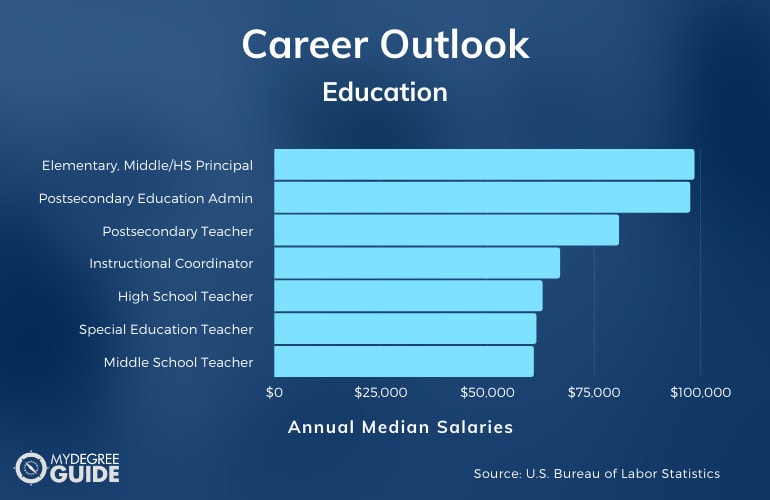Some scholarships may be offered by your prospective school, others by charitable groups, or government-supported programs.

If you value knowledge, inquiry, and learning, and like helping others, getting an online masters in education is a good way to open up a range of career options in a very dynamic field rich in human interactions and networks.
Editorial Listing ShortCode:
If you already work as a teacher or educator, getting a master’s degree will usually allow you to get immediate pay raises or salary stipends and make you eligible for leadership roles.
While most educators share a sense of social mission, open-minded curiosity, and an altruistic nature, you’ll also find that jobs in education reflect unique roles and specializations.
Universities Offering Online Master’s in Education Degree Programs
Methodology: The following school list is in alphabetical order. To be included, a college or university must be regionally accredited and offer degree programs online or in a hybrid format.
1. California State University – Fullerton
California State University – Fullerton offers both master’s and doctoral degrees in education.
Four of its Master of Science in Education programs are offered entirely online including the M.S. in Elementary Curriculum and Instruction, M.S. in Educational Technology, and M.S. in Education degrees with concentrations in secondary education or special education.
California State University – Fullerton is accredited by the Western Association of Schools and Colleges Senior College and University Commission.
2. Clemson University
The Master of Education in Literacy program at Clemson University provides students with in-depth knowledge of all aspects of literacy including curriculum, research, strategies, process and theories.
Graduates should be able to plan appropriate literacy programs and curricula and communicate information effectively to students of all ages and their families.
Clemson University is accredited by the Southern Association of Colleges and Schools Commission on Colleges.
3. Columbia International University
Students in Columbia International University’s Master of Education program can choose from concentrations in either instruction and learning or educational administration. Both tracks help students cultivate exceptional educational leadership skills.
Students should also learn to apply biblical educational theories to teaching, create nurturing school environments, and possess effective research techniques.
CIU is accredited by the Southern Association of Colleges and Schools Commission on Colleges.
4. Florida International University
The Master of Science in Educational Leadership program at Florida International University requires 39 credits to complete, doesn’t require applicants to take the GRE and can be completed in 16 months.
Common courses include leadership in education, instructional leadership, school personnel administration, foundations of educational research, and other leadership-related courses.
Florida International University is accredited by the Southern Association of Colleges and Schools Commission on Colleges.
5. Lamar University
Lamar University’s Master of Education in Teacher Leadership degree program allows students to select from two concentrations: English as a second language or gifted and talented.
Both tracks are non-thesis degrees that blend the in-depth research, standard coursework, and hands-on experience needed for educators to become masters in their fields.
Lamar University is accredited by the Southern Association of Colleges and Schools Commission on Colleges.
6. Michigan State University
Michigan State University’s Master of Arts in Education program is one of the nation’s oldest online education programs. There are six concentrations from which students can choose.
They are special education, technology and learning, literacy education, sport coaching and leadership, science and mathematics education, and P-12 school and post-secondary leadership.
MSU is accredited by the Higher Learning Commission.
7. North Carolina State University
North Carolina State University offers several, 100% online Master of Education degrees in a variety of fields. These include, but aren’t limited to, training and development, various STEM degrees, school counseling, learning design and technology, elementary education, and community college teaching.
The school is affordable, and financial aid is available for qualified students.
North Carolina State University is accredited by the Southern Association of Colleges and Schools Commission on Colleges.
8. Northeastern University
Students interested in education at Northeastern University can select online master’s programs in either special education, higher education administration, eLearning and instructional design or learning and instruction. All programs are offered either part-time or full-time and can be completed in two years or less. Courses vary based on the program.
Northeastern University is accredited by the New England Commission of Higher Education.
9. Nova Southeastern University
The Master of Science in Education program at Nova Southeastern University has eight concentrations from which students can choose. These include selecting specific subjects (math, reading, science, Spanish), elementary education, exceptional student education, and curriculum and instruction.
The school also offers a Master of Science in Educational Leadership program.
NSU is accredited by the Southern Association of Colleges and Schools Commission on Colleges.
10. Purdue University
Purdue University offers four different Master of Science programs in educational-related fields. These include curriculum and instruction, applied behavior analysis, special education, and learning design and theory.
Core courses focus on researching educational trends, best practices for educators, and educational leadership. Required credits for completion range between 30 and 45.
Purdue University is accredited by The Higher Learning Commission.
11. San Diego State University
Students enrolled in San Diego State University’s Master of Arts in Teacher Leadership program can potentially graduate in as few as 12 months. The program is designed for current educators looking to take on leadership roles within their schools that’ll allow them to educate other teachers in addition to students.
San Diego State is accredited by WASC Senior College and University Commission.
12. University of Alabama – Birmingham
University of Alabama – Birmingham offers multiple Master of Education degree programs and two Master of Science programs in education-related fields. All nine of the programs are offered online but may require students to visit the UAB campus sporadically. GRE scores are required for entrance into most of these programs.
The University of Alabama at Birmingham is accredited by the Southern Association of Colleges and Schools Commission on Colleges.
13. University of Central Florida
The Master of Education in Exceptional Student Education program at University of Central Florida is perfect for educators hoping to work specifically with special needs students. The program is designed for current educators looking to move into special needs positions such as literacy coaches, autistic teachers, or speech and audio therapists.
The University of Central Florida is accredited by the Southern Association of Colleges and Schools Commission on Colleges.
14. University of Colorado – Denver
University of Colorado – Denver offers a Master of Arts in Literacy Education program that features a concentration in reading and writing and has an additional reading teacher (K-12) endorsement included with it. The curriculum is designed to help educators become masters of oral language, reading, writing, and other English-related fields.
The University of Colorado – Denver is accredited by the Higher Learning Commission.
15. University of Georgia
There are several Master of Education (M.Ed.) programs at the University of Georgia including programs in reading education, workforce education, design & technology, instructional design & development, and two educational psychology programs with different concentrations.
The curriculum varies depending on the program, and the school does not charge out-of-state tuition.
The University of Georgia is accredited by the Southern Association of Colleges and Schools Commission on Colleges.
16. University of Illinois – Urbana Champaign
Students interested in the Master of Education program at University of Illinois – Urbana Champaign have several subject areas from which to choose. The school offers bilingual and bi-cultural degrees, digital learning degrees, and six other education degrees.
Each program seeks to ensure teachers are exceptionally knowledgeable in their specific subject areas.
The University of Illinois at Urbana-Champaign is accredited by the Higher Learning Commission.
17. University of San Diego
University of San Diego’s Master of Education program allows students to choose from five different concentrations: STEM, curriculum and instruction, literacy and digital learning, school leadership and inclusive learning: special education and universal design.
Each concentration requires courses in social justice, educational equity, educational research methodology and cognition and learning.
USD is accredited by the Western Association of Schools and Colleges Senior College and University Commission.
18. University of South Carolina
There are several education-focused graduate programs at the University of South Carolina at both the master’s and doctoral levels. Whether students are interested in educational administration, physical education, STEM education, or language and literacy, USC has them covered.
Coursework is designed to mirror the high-quality work required of on campus students.
The University of South Carolina is accredited by the Southern Association of Colleges and Schools Commission on Colleges.
19. University of South Florida
Students at the University of South Florida have several options when it comes to education master’s programs including Master of Education, Master of Science, Master of Arts and Education Specialist programs in various concentrations.
Some of these programs are offered entirely online, others in hybrid format. Financial aid is available for qualified students.
USF is accredited by the Southern Association of Colleges and Schools Commission on Colleges.
20. University of Southern California
The University of Southern California offers five master’s level programs and three doctoral programs in the field of education all online. The programs are all designed for current teachers, counselors, and other educators looking to improve their teaching skills and cultivate leadership skills to become effective leaders in their schools.
USC is accredited by the Western Association of Schools and Colleges.
21. University of St Thomas
The University of St. Thomas offers several Master of Arts (M.A.) programs in education, educational studies, special education and educational leadership. Each of these programs is further broken down into more specific areas of concentration. Both the M.A. in Education and the M.A. in Special Education can lead to licensure.
The University of St. Thomas is accredited by the Higher Learning Commission.
22. University of the Cumberlands
The Master of Education Administration program at University of the Cumberlands has NCATE accreditation and adheres to all standards set by the CAEP. It doesn’t lead to licensure, but it designed to provide licensed professionals with a deeper understanding of the knowledge, skills and dispositions needed to become the best educators possible.
The University of the Cumberlands is accredited by the Southern Association of Colleges and Schools Commission on Colleges.
23. Webster University
Webster University’s Master of Arts in Education and Innovation program seeks to turn educators into lifelong learners, global citizens, and leaders in curriculum design and education. A premium is placed on collaboration, real-world problem solving, and educational technology implementation.
Graduates should be prepared to become team leaders and learning facilitators.
Webster University is accredited by The Higher Learning Commission.
24. West Texas A&M University
Students in West Texas A & M University’s Master of Education in Curriculum and Instruction program will take many courses in curriculum theory and history, multicultural education and human development. The program requires 36 total credit hours for completion, and students will take a comprehensive exam in their last semesters.
West Texas A&M University is accredited by the Southern Association of Colleges and Schools Commission on Colleges.
25. Wilmington University
The College of Education at Wilmington University offers several online certificate, undergraduate, and graduate programs in education.
Some of the programs being offered at the master’s level include programs in higher education, special education, applied technology, school leadership, reading, and school counseling. There are both licensure and non-licensure tracks available.
Wilmington University is accredited by the Middle States Commission on Higher Education.
Online Masters in Education Programs
Your online masters in education can help you launch or advance a career in teaching, school administration, early childhood education, instructional design, special education, English as a second language, or bilingual education.
Those working in education usually benefit from graduate programs, but also pursue specific specializations and state certifications based on their professional interests.
Select the program that most interests you to jump to that section of the guide:
- Early Childhood Education
- Educational Administration
- Elementary Education
- Higher Education
- Special Education
Exploring your options may help you determine which academic path is right for you.
Early Childhood Education

A masters in early childhood education can help give you the training you need to support programs for young children with proven, research-based practices.
In this field, you can explore fascinating theories of psychological development and identity formation. Your courses may include topics like how children develop moral beliefs, acquire language, or learn to read.
You can learn about common childhood challenges, disabilities, and developmental stages, and how to assess developmental progress and respond to special needs.
Editorial Listing ShortCode:
With a masters in education and a focus on early childhood education, you can launch a career working with younger children as a highly effective teacher, reading specialist, instructional coach, or ESL/Bilingual education specialist.
A masters degree can also help qualify you to work in early childhood program administration—leading programs and other educators in elementary schools, preschools, and childcare centers.
Educational Administration

Whether at the K-12 level or postsecondary level, schools are actually very complex organizations. Perhaps you’ll want to focus on learning how to be a school leader.
School administrators promote robust communication links between staff, students, families, and community partners while helping give direction to complex planning challenges.
Editorial Listing ShortCode:
But that’s not all…They need to carry out the school mission and drive innovation amid layers of regulatory laws and policies governing instruction, hiring, budgets, equity, and special education rights and protections. Those outside the profession often fail to grasp just how challenging the job can be.
Getting a masters online degree in education with a concentration in school administration can be a great way to step into such a rewarding and challenging role with greater confidence. Your online master’s degree can be key in helping you qualify for administration and organizational leadership jobs, in both K-12 and higher education settings.
Elementary Education

If you’re an elementary teacher, enrolling in an online education masters program can be a great way to move forward in your career. A master’s in education usually rewards K-8 teachers with salary increases or salary stipends, since most school districts link teacher compensation increases to continuing education.
Getting a Master of Education online can also help a teacher expand into new areas of teaching competency. For example, new subject matter competency or qualifying for a special education teacher certification.
School leaders also know that using teachers in peer-mentoring systems are a proven way to build organizational capacity in school settings, within sites and across larger school districts.
Editorial Listing ShortCode:
Teachers who take advanced college courses in instructional methods, curriculum design, assessment systems, and classroom management, are typically well qualified for these coaching and mentoring roles.
With your master’s degree in elementary education, you’re more likely to qualify for work as an instructional coordinator or curriculum specialist or transition to administrative roles with more confidence and success.
Higher Education

A masters program is almost indispensable for any teacher who wants to teach in higher education. An online masters in education can be a good way to get qualified to teach in a technical or vocational college or to teach foundational courses in four-year degree programs, or at community colleges.
Administrative jobs in higher education are also growing increasingly demanding and complex. Many factors today are creating new funding and enrollment challenges for colleges and universities.
Leading colleges today involves fundraising, legally and financially complex corporate research partnerships, navigating diversity and equity laws, free speech issues, budget cuts, and remote learning.
Editorial Listing ShortCode:
Colleges and universities can’t simply rely on tenured faculty to navigate these challenges. Today’s colleges need well trained, education-focused administrators.
With a masters degree, a concentration in higher education, and the right experience, you can pursue a career teaching at a number of postsecondary schools or in postsecondary school administration.
Special Education

Assessing special needs students and providing appropriate support and intervention services are a central job of special education teachers.
A second aspect of the job is compliance with the complex laws and regulations that safeguard special needs students and ensure schools do everything possible to support their assimilation and success.
This means K-12 schools have an urgent need for skilled and dedicated special education teachers and special education coordinators.
Editorial Listing ShortCode:
If you have an interest in case management, behavior intervention, childhood and adolescent development, disability assessments, and coordinating with paraprofessional support providers, you may be able to provide schools and exceptional students with valuable support.
Online masters in education programs supporting special education licensure can be a great way to launch a life-time career in this crucial role. School districts are often eager to find qualified SPED specialists and retain them with good pay.
Masters in Education Careers & Salaries

Master of Education online programs are well suited for educators who entered the field with a bachelor’s degree and want to boost their job qualifications and or seek promotion in the field.
Many school system contracts reward teachers with pay increases based on continuing education credits and for advanced degrees. For many educators, getting a masters in education online means an instant pay boost, even in their current job.
For those interested in entering the field or promoting into new job roles, online education masters programs can be a good first step for launching a career in school administration roles.
Combining your degree with prior teaching experience can be a great way to move from teaching into a role as a curriculum specialist or instructional coordinator. Finally, a masters in education may qualify you for district-level K-12 administration jobs and for opportunities in teaching or leadership positions at postsecondary institutions.
Online masters in education programs will usually introduce you to advanced research as well. This means an opportunity to explore options for an eventual career in education research related to instruction, leadership, or social policy.
According to the Bureau of Labor Statistics, your online education master’s degree should help you qualify for or excel in a range of school-related occupations:
| Careers | Annual Median Salaries |
| Elementary, Middle, or High School Principal | $98,490 |
| Postsecondary Education Administrator | $97,500 |
| Postsecondary Teacher | $80,790 |
| Instructional Coordinator | $66,970 |
| High School Teacher | $62,870 |
| Special Education Teacher | $61,420 |
| Librarian | $60,820 |
| K-8 Teacher | $60,660 |
| Career and Technical Education Teacher | $59,140 |
| School and Career Counselor | $58,120 |
While a bachelor’s degree may suffice for some of these jobs, a master’s degree in education is typically required for the best paying jobs, will likely reward you with pay raises if you’re already in an education job, and can help you qualify for leadership positions.
Choosing an Online Master of Education Program
Since working in education involves curriculum design skills, administrative concentrations, and specializations based on subject areas and age-groups, you’ll want to choose an online masters in education aligned with well-defined career goals.
When you compare schools and programs, here are some things to keep in mind:
- Access, flexibility, enrollment dates, and completion timelines
- Whether the programs are hybrid learning or fully remote learning
- How well the course outlines and areas of concentration offered match your professional interests and goals
- If the program provides direct support for your completing any state-mandated licensure or certification requirements (for the jobs you’re pursuing)
- If a master’s thesis is required or optional
- If the program includes a practicum, field study, student teaching, or hands-on action research (and what these components require)
- Whether the program and school are fully accredited
- If the master’s program participates in a local or regional school-to-work network or coalition (or job pipeline)
- If it’s better to attend a college in the state where you plan to work since many public school systems are shaped by state laws and licensing commissions
What you learn in your online graduate program is likely to be important for your success, so making sure the academic concentrations and resources align with your goals.
Masters in Education Curriculum & Courses

Whether it’s courses on social policy, a concentration in psychology, organizational leadership skills, or learning about ed-tech innovations, your education masters courses should cover a lot of ground!
Here’s a sample of the types of courses you’ll likely see in online education masters programs:
- Social and Cultural Theories in Education: This course explores education as a value-laden social and cultural construct while analyzing competing theories of education.
- Curriculum Supervision: This course gives aspiring education leaders knowledge and methods for assessing and monitoring curriculum goals and explores concepts for implementing fair and effective teacher evaluation systems.
- Educational Equity: Learn about a range of instructional frameworks for helping ensure the success of all students—differentiated instruction, emotional intelligence, learning modalities, the influence of family, and cultural background.
- Digital Classrooms: Learn about emerging educational technologies, including AR, VR, and AI, and their classroom applications, as you explore the intersection of technology innovation and instructional transformation.
- Contemporary Pedagogy: Learn about instructional themes and models that go beyond or supplement traditional instructional formats: project-based learning, flipped classrooms, 21st-century learning, and collaborative learning.
- Organizational Leadership: Explore theories of organizational psychology and innovation-focused leadership for driving improvements to school systems and cultures.
- Student Assessment: Students learn about different types of student assessment and where they fit into larger school improvement and instructional designs, including special education evaluations.
- Education Administration: An overview of the rules, systems, and concepts needed to provide oversight of and accountability for staffing needs, professional development systems, budgets and spending, student services, school safety and emergency preparedness.
- School Law and Policy: Learn the ins and outs of legal statues governing instructional minutes, free and public education mandates, student equity and privacy protections, federal special-education provisions, fair hiring practices, academic accountability measures, and student discipline codes and procedures.
- Education Research: This course introduces students to a range of research resources, methods and standards, including action-research designs, for implementing evidence-based instructional practices and policies, for gauging the impact of existing practices, and for engaging in policy-oriented advocacy.
These courses make it easy to see why education is a fascinating field with a great need for people committed to pursuing ongoing professional learning in masters programs and beyond.
Admissions Requirements for a Master’s Degree in Education
In most cases having a bachelor’s degree will be required for admission into online masters in education programs. You’ll also need to provide GRE scores, if required. Some schools and programs may also want to see that applicants have some work history in education, usually as a credentialed teacher for several years.
Make sure you’re prepared to provide all undergraduate transcripts and evidence of a satisfactory college GPA (usually 3.0 or above) along with any required letters of recommendation.
Master’s Degree Accreditation

We strongly recommend you select from fully accredited schools and programs. The accreditation process helps ensure academic quality and consistency. Accreditation also means other schools and prospective employers are more likely to honor your degree and your achievements.
A school gets accredited by passing periodic reviews by a recognized accreditation agency. An organization such as the Council on Higher Education Accreditation (CHEA) can help you learn more about accreditation and identify accredited schools.
Finally, if you’re focused on teacher preparation skills, you might want to check out CAEP as well (Council for the Accreditation of Educator Preparation).
Financial Aid and Scholarships

There are many types of financial aid to consider. There are federal student loan programs, work study programs, various forms of state aid, and a range of scholarships. Some scholarships may be offered by your prospective school, others by charitable groups, or government-supported programs.
Since federal loan programs, state aid, and some scholarship opportunities often require a demonstration of financial need, it’s always a good idea to fill out the free application for financial student aid ahead of time (FAFSA).
You may also find state or federal student loan forgiveness programs. These programs typically allow qualifying participants to pay off student debt more quickly based on years of service in the field. Finally, if you’re working in education already, you may be eligible for employer-based tuition assistance programs.
What Can You Do With a Masters in Education?

A master’s in education online can help you move from a teaching job into a more senior role as a lead teacher, instructional coach, instructional coordinator, or curriculum design specialist.
You can also boost your expertise in such areas as special education, early childhood education, or ESL/Bilingual education. An online education master’s program can also a great way to get qualified to move from a teaching job to a role in school administration.
In fact, different online education masters programs offer unique concentrations in the field. If administration jobs interest you, there are programs that focus on school leadership, just as other programs offer a focus on curriculum design, special education, or public policy.

If you’re not already working in the field, a master’s degree can help you hit the ground running with knowledge that should help you quickly become an expert teacher with opportunities for rapid advancement if you desire.
If you’re looking for advancement in the field, remember that getting an advanced degree may boost your pay, even in your present job. Finally, you’re likely to need mandatory state certifications or licenses, in addition to your college degrees, for most education jobs.
How Much Does a Masters Degree in Education Cost?
Tuition costs vary significantly by school. You can expect to pay between $350 and $1,200 per credit hour in online masters in education programs. A masters program typically requires between 30 and 36 credit hours.
School admissions officers will often be able to help you understand costs involved in your online program. Remember to weigh the costs of your online degree program against your anticipated earnings over many years of future employment and to look for fully accredited schools.
How Long Does It Take to Get a Masters Degree in Education?

In most cases, anticipate it will take you about two years to complete a Master of Education online program. You should find online programs offering accelerated study timelines too. Some programs, such as one year online masters in education programs, may allow you to finish in as little as 12 to 17 months on an 8 week semester with year-round continuous enrollment.
Keep in mind that many masters in education online programs will also require a research thesis. For capstone projects like a thesis, individual completion times may vary. Finally, if you’re in a program that includes a field study or teaching practicum component, be sure to include that step, if necessary, when estimating your time to completion.
Are There Any Affordable Online Masters in Education Programs?

More affordable online Masters in Education programs offer tuition rates between $300 and $500 per credit hour. If you’re shopping for more competitive tuition rates, we recommend you still take care to choose a fully accredited school and master’s degree program.
Finally, taking advantage of in-state tuition rates or special e-tuition rates for online students, regardless of your state of residence.
Are There Any Online Masters in Education No GRE Programs?
GRE (Graduate Record Examinations) scores are part of admission’s requirements for many master’s degree programs, but certainly not all. Some students prefer to avoid the time, preparation, and costs involved with providing prospective schools with GRE scores (often required with application packets).
If you’re one of those students, it’s true you’ll have to exclude some schools from your list, but you’ll still find many schools that offer “no GRE” or “test optional” admissions. If you feel flexible in your choice of schools, it’s possible you’ll find a no GRE online masters in education program that fits your needs and professional goals.
How Many Credits for a Masters Degree in Education to Complete the Program?

Most online masters in education programs will typically require between 30 and 36 credit hours for completion. Many programs will also require students submit a thesis or complete some other capstone project.
There may also be optional or required field study or practicum activities involved in completing your online masters in education. Finally, many education jobs will require state-governed licensure or certification as well.
What Can I Do With a Masters in Education Besides Teach?
There are many ways to support schools outside of traditional teaching jobs. For most non-teaching jobs, though, prior teaching experience is usually an important requirement. Job pre-requisites may vary by state too, based on guidelines or policies issued by state boards or commissions related to public schools, both K-12 or postsecondary.
Most teachers who have completed a master’s degree and are ready for new horizons and challenges will apply for a principal or assistant principal role, seek to lead curriculum planning, help with peer coaching, or work as instructional specialists.
Sometimes teachers can “learn-on-the-job” by taking a “special assignment” within their district. These assignments usually help fill a short-term personnel gap and provide ready opportunities for successful teachers to try on more advanced roles.
By moving into a special assignment—taking on an administration role, assisting with curriculum supervision, or mentoring other teachers—you can learn new skills that help qualify you for long-term promotions.
Is a Masters in Education Worth It?

Yes, a masters in education is worth it for many students. In education, training, and library field, jobs are projected to grow at a rate of 5% in the next 10 years (Bureau of Labor Statistics).
Common careers for people with an education masters include teacher, instructional coordinator, K-12 principal, K-12 teacher, postsecondary teacher, and postsecondary education administrator.
For many teachers, an online masters in education will also qualify them for immediate salary increases or additional salary stipends. By combining successful teaching experience with an education masters, you’ll also position yourself for more dynamic professional growth going forward.
Getting Your Masters in Education Online

In today’s fast-changing society there’s tremendous pressure on schools to modernize and adapt. Both K-12 education and postsecondary institutions are facing dynamic change pressures at the intersections of social policy, technology, and economic transformations.
In your online masters in education program, you can learn lessons gleaned from decades of school reform successes and failures…and then you may be asked to help build the schools of tomorrow while serving the students who count on you today. Are you up for the challenge?
